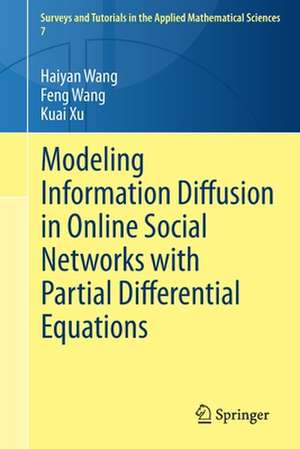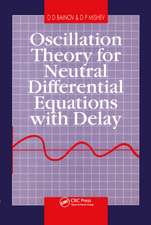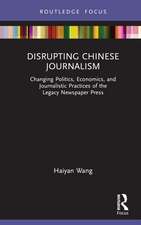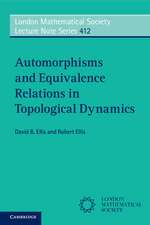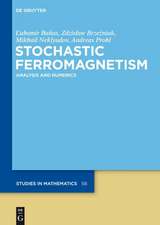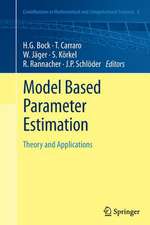Modeling Information Diffusion in Online Social Networks with Partial Differential Equations: Surveys and Tutorials in the Applied Mathematical Sciences, cartea 7
Autor Haiyan Wang, Feng Wang, Kuai Xuen Limba Engleză Paperback – 17 mar 2020
Preț: 479.85 lei
Nou
Puncte Express: 720
Preț estimativ în valută:
91.82€ • 98.19$ • 76.56£
91.82€ • 98.19$ • 76.56£
Carte tipărită la comandă
Livrare economică 18 aprilie-02 mai
Preluare comenzi: 021 569.72.76
Specificații
ISBN-13: 9783030388508
ISBN-10: 3030388506
Pagini: 144
Ilustrații: XIII, 144 p. 39 illus., 29 illus. in color.
Dimensiuni: 155 x 235 mm
Greutate: 0.23 kg
Ediția:1st ed. 2020
Editura: Springer International Publishing
Colecția Springer
Seria Surveys and Tutorials in the Applied Mathematical Sciences
Locul publicării:Cham, Switzerland
ISBN-10: 3030388506
Pagini: 144
Ilustrații: XIII, 144 p. 39 illus., 29 illus. in color.
Dimensiuni: 155 x 235 mm
Greutate: 0.23 kg
Ediția:1st ed. 2020
Editura: Springer International Publishing
Colecția Springer
Seria Surveys and Tutorials in the Applied Mathematical Sciences
Locul publicării:Cham, Switzerland
Cuprins
Ordinary Differential Equation Models on Social Networks.- Spatio-temporal Patterns of Information Diffusion.- Clustering of Online Social Network Graphs.- Partial Differential Equation Models.- Modeling Complex Interactions.- Mathematical Analysis.- Applications.
Textul de pe ultima copertă
The book lies at the interface of mathematics, social media analysis, and data science. Its authors aim to introduce a new dynamic modeling approach to the use of partial differential equations for describing information diffusion over online social networks. The eigenvalues and eigenvectors of the Laplacian matrix for the underlying social network are used to find communities (clusters) of online users. Once these clusters are embedded in a Euclidean space, the mathematical models, which are reaction-diffusion equations, are developed based on intuitive social distances between clusters within the Euclidean space. The models are validated with data from major social media such as Twitter. In addition, mathematical analysis of these models is applied, revealing insights into information flow on social media. Two applications with geocoded Twitter data are included in the book: one describing the social movement in Twitter during the Egyptian revolution in 2011 and another predicting influenza prevalence. The new approach advocates a paradigm shift for modeling information diffusion in online social networks and lays the theoretical groundwork for many spatio-temporal modeling problems in the big-data era.
Caracteristici
Provides a new and timely modeling approach for information diffusion in social media Written by the experts who initiated the approach of modeling with partial differential equations (PDEs) Accessible to a wide range of readers in mathematics, computer science, and social media Presents models which have been validated with real datasets from popular social media sites
